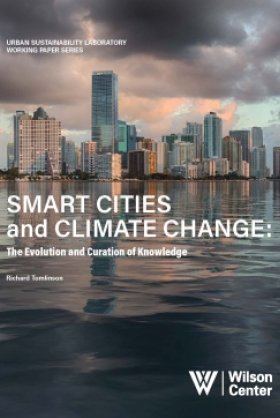Smart Cities and Climate Change: The Evolution and Curation of Knowledge


Urban Sustainability Laboratory Working Paper Series
Richard Tomlinson traces the evolution and curation of knowledge for climate change, smart cities and digital technologies at the metropolitan level. Tomlinson charts the forces underlying the evolution of urban knowledge, spanning the decades from 1990 to 2020, beginning with the collapse of the Soviet Union and the rise of neoliberalism, the development of the Web and digital technologies, globalization and global city competition, and the climate crisis.
Transnational city networks have played a significant role in curating this knowledge, producing roadmaps with recommendations for urban climate change mitigation and adaptation policies and programs, and sometimes also strategies for the digital transformation of cities. Attention to smart cities and their digital transformation is more common in Europe where city networks and European Union initiatives have promoted digital technologies while attending to concerns for citizen digital privacy and open data standards.
Tomlinson includes in the discussion the implications of neoliberalism and the role of opaque algorithms in constraining transparent governance and local democracy.
Author

Professorial Fellow, Faculty of Architecture, Building and Planning, University of Melbourne; Visiting Professor, School of Architecture and Planning, University of the Witwatersrand, Johannesburg

Urban Sustainability Laboratory
Since 1991, the Urban Sustainability Laboratory has advanced solutions to urban challenges—such as poverty, exclusion, insecurity, and environmental degradation—by promoting evidence-based research to support sustainable, equitable and peaceful cities. Read more

Explore More
Browse Insights & Analysis
Apprenticeships Are an Overlooked Path to Upward Mobility

Planning for Resilience In and After Conflict—A World Away



